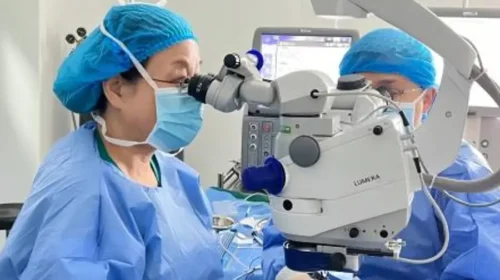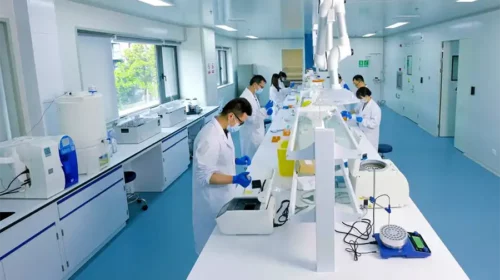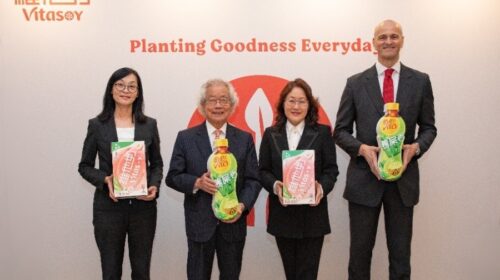Junshi hopes new scientist CEO can cure its woes

The biotech company has been dogged by multiple challenges recently, including declining revenue, ongoing losses and a recent rejection by one of its overseas partners
Key Takeaways:
- Junshi has appointed its former deputy general manager and president of global R&D as its new CEO
- The innovative drug maker has struggled from instability in its R&D and commercialization teams, whose key executives have changed several times in recent years
By Molly Wen
A slump in China’s biomedical industry has left both startups and established players struggling financially, leading to big turnover in their top ranks. Industry giant Shanghai Junshi Biosciences Co. Ltd. (1877.HK; 688180.SH) joined that group this month, when it announced that Zou Jianjun, its former deputy general manager and president of global R&D, would take over at the company’s helm as its general manager and CEO. Meanwhile, it said former CEO Li Ning would become vice chairman of the company and chairman of its wholly-owned subsidiary TopAlliance Biosciences, in charge of its overseas operations.
The news was hardly soothing to investors, who bid down the company’s shares by a cumulative 15.7% over the next five trading days. But the C-suite turbulence is hardly a surprise for Junshi, whose stock has plummeted around 70% from HK$46 at the beginning of 2023 to just HK$14.18 at its latest close on Wednesday. Its decision to promote an insider, instead of bringing outside forces for a much-needed rejuvenation, clearly left investors unimpressed.
The new CEO Zou comes from a scientific background, holding a PhD in clinical oncology and with more than 20 years of clinical experience in cancer drug research. She previously served as medical manager of the China oncology R&D department, head of treatment, and head of global medical affairs for global pharma giant Bayer, and also worked as chief medical officer and deputy general manager at Jiangsu Hengrui Medicine.
She left Hengrui in 2022 after the company made steep pay cuts for its senior executives, and joined Junshi just eight days later as head of its R&D. Junshi promised her an annual salary of more than 4 million yuan ($446,000) plus 3 million shares through incentive programs, in a package far more generous than for all senior Hengrui executives at the time.
But her promotion hardly came at the best moment for Junish, which was facing multiple headwinds, including declining revenues, continued losses and the breakup of a partnership aiming to export one of its drugs overseas. In the first three quarters of 2023, its revenue fell 19% to 986 million yuan ($139 million), as it reported a net loss of more than 1.4 billion yuan for the period.
Sales for the company’s key product, Toripalimab, have been a big part of the problem with their recent volatility. As the first domestic PD-1 drug approved by China in 2018, the drug’s sales grew from 774 million yuan in 2019 to 1 billion yuan in 2020. But as more domestic PD-1 drugs entered the market, and Junshi failed to get the drug into China’s national health plan, Toripalimab sales plummeted to 412 million yuan in 2021. The figure rebounded somewhat to 736 million yuan in 2022 after the drug was approved for two additional major indications, and revenue grew about 30% year-on-year to 668 million yuan in the first three quarters of last year.
Sales for Junshi’s other products have been more lackluster. In the first three quarters of 2023, its small-molecule oral Covid drug Mindewei generated revenue of 124 million yuan, while its Adalimumab brought in about 99.4 million yuan, and its earlier Covid neutralizing antibody Etesevimab no longer contributed any revenue at all.
In a nutshell, Junshi’s big breadwinner, Toripalimab, is defending its ground against growing competition, and the company has no new blockbusters to come and pick up the slack.
Adding to the problems are turbulence within Junshi, whose R&D and commercialization teams have gone through major overhauls these last few years. Its commercialization team had three directors between 2018 and the end of 2021, including the last two who served for just a year and four months, respectively. The company finally found some stability in November 2021 when Li Cong became its co-CEO overseeing all commercialization efforts.
The situation was equally turbulent in the company’s R&D department when chief scientist Wu Hai and key technician and executive director Feng Hui resigned last August. The pair are two of the company’s four key technicians, according to its previous prospectus to the Shanghai Stock Exchange. According to its previous financial statements, the number of R&D staffers also decreased from 995 at the end of 2022 to 854 at the end of June last year.
Collapse of U.S. drug deal
The company also suffered a major setback at the start of this year when Coherus (CHRS.US), one of its U.S. partners, announced the termination of its licensing collaboration for Junshi’s recombinant humanized anti-TIGIT monoclonal antibody, called project JS006. Coherus agreed to not to seek the return of the $35 million it gave Junshi at the start of the collaboration, nor would it seek to recoup its share of the R&D spending. Still, Junshi’s 2022 financial statement showed it invested 51.55 million yuan in the JS006 project that year for R&D, equal to 3.55% of its annual revenue.
In October last year, Toripalimab was approved in the U.S. to treat two nasopharyngeal cancer-related indications, making it the first Chinese PD-1 monoclonal antibody to win such approval in the U.S. The drug is also the only one approved for the treatment of nasopharyngeal cancer in the U.S., with Coherus as its partner in the market.
But nasopharyngeal cancer cases are more concentrated in Europe, and the U.S. only accounts for a small number, limiting the drug’s potential. Coherus estimates that there are only 2,000 new cases of nasopharyngeal cancer in the U.S. each year, with sales of Toripalimab likely to peak at about $200 million in the market. Given that Junshi only gets 20% of that, the drug’s U.S. sales will have only limited potential to boost to the company’s revenue.
Junshi’s is developing drugs in five treatment areas, including malignant tumors, autoimmune diseases, chronic metabolic diseases, nervous system diseases and infectious diseases. In addition to its four approved products, it has nearly 30 more in various clinical trials and more than 20 in the pre-clinical development stage. So, the company will continue to incur big R&D expenses.
Junshi’s Hong Kong-listed shares currently trade at a price-to-sales (P/S) ratio of about 10 times. That’s well ahead of the 7 times for BeiGene (BGNE.US; 6160.HK; 688235.SH), which also has a PD-1 product approved in the EU, suggesting Junishi enjoys a valuation premium. Its new CEO has a solid clinical R&D track record, though it remains to be seen whether she can steer the company to greater commercial success.
The Bamboo Works offers a wide-ranging mix of coverage on U.S.- and Hong Kong-listed Chinese companies, including some sponsored content. For additional queries, including questions on individual articles, please contact us by clicking here.
To subscribe to Bamboo Works free weekly newsletter, click here






